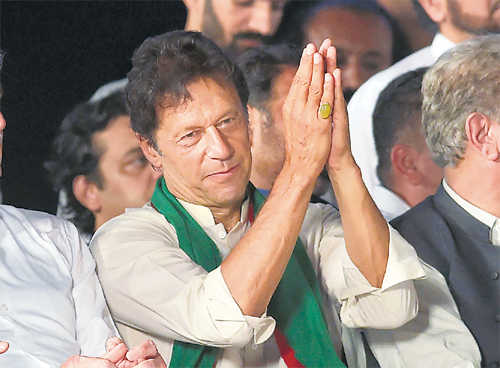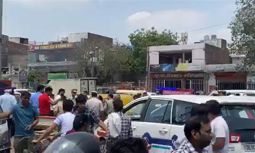
Imran Khan. AfP
RK Kaushik
Secretary, Government of Punjab
Never before has a cricketer inched so near the prime-ministership of a country as Imran Khan has in Pakistan. As Pakistan goes to the polls on July 25, it is clear that Imran Khan's Tehreek-e-Insaf (Movement for Justice) has become a force to reckon with and may become the largest party in the 342-member National Assembly. It would be the result of his anti-corruption crusade against Nawaz Sharif, his family, his ministers and other leaders of the Pakistan Muslim League (Nawaz).
Imran's father Ikramullah was a 'Niazi' Pathan from Mianwali and his mother was a 'Burki' Pathan. They settled in Lahore and had an upper middle class lifestyle. Imran was born on October 5, 1952, in Lahore. He studied in Cathedral School, Aitcheson College and Oxford University. He played 88 Test matches and 175 ODIs for Pakistan in his cricket career and led his team to win the World Cup in 1992.
He founded the Pakistan Tehreek-e-Insaf (PTI) on April 25, 1996 in Lahore. It was initially a socio-political movement. It grew slowly. He claimed that it represented the true aspirations of the people of Pakistan.
It was at Minar-e-Pakistan on October 20, 2011 that the PTI organised a massive rally, attended by more than 2 lakh people who responded to Imran Khan's agenda for the strengthening of economy, good law and order and progress and prosperity of Pakistan. The Establishment woke up from its bamboozlement and decided to back Imran Khan as an alternative to Nawaz Sharif.
Imran has been consistent against corruption since the beginning. In December, 2012, the NAB (National Accountability Bureau), an autonomous state body, put into place to ensure transparency in government functions, announced through a report that corruption of around Pakistan Rs 10 billion per day is done in the country. The report blamed senior politicians for being the real suspects, followed by the bureaucracy that controlled the state machinery. None of the political parties took the report seriously. However, Imran repeatedly harped on the issue in his various interviews and public speeches.
He bluntly undermined the VIP culture that had found permanence in the Parliament House. He gravely resented the narcissist, fortune lovers of the political elite, censuring the huge expenses incurred by officials and politicians on foreign trips. This is all state money, protested Imran, gallantly educating everyone. Such pejorative commentary, reeking of ridicule, was unheard of in the political dimensions of the country.
Imran suggested that he was a disciple of righteous politics and preached sthe upremacy of law, rallying around a number of themes that resonated with the people. Among them was a dream to build a great country. He was inspired by the politics of Nelson Mandela and the contents of western-style democracy, hugely borrowing from the life of Mandela and often exalting him in his speeches and interviews. He stressed on the need for strong institutions, drawing examples from Europe.
On matters of justice, social security and female empowerment, Imran had already silver-tongued a few steps prior to the elections to strengthen his campaign. He spoke vociferously in favour of a strong local government system and championed the idea of a decentralised political system, stating thereby that speedy justice in remote areas can only be delivered through small courts established in villages. He promised female empowerment through education and promoting female entrepreneurship. He suggested development at the grassroot level through community organisations, pledging to uplift the standards of education and health and focusing his energies in increasing the education and health expenditures from their current depressingly sinking levels. Equality of opportunity is another aspect he preaches with a missionary zeal.
He also alleged that the Nawaz Sharif government had come into power by manipulating the election process in 2013.
It is clear that Imran and his party have the support of the Establishment. On June 14, the Election Commission clarified that the Pakistan Army would stand both inside and outside the polling booths in the coming elections. That it would have a toggling effect is clear to every observer.
Imran says a lot of things that sound great. But changing national policies and stabilising Pakistan's economy will require much more than animated applause lines at rallies. He says he won't allow any militant group to grow from Pakistan. He says if he becomes PM, the Army and ISI will answer to him and that he will set up an 'é-governance system' which will eliminate corruption and kickbacks from society. He promises free legal aid, health care and education. He promises that the police will treat everyone equitably — from the lowest vagabond to the PM himself. The tax system will be reformed so that it becomes perfectly just, and everyone gleefully pays.
In the 2013 elections, the PTI won 34 seats in the National Assembly (out of the total strength of 342) and later got 13 seats in the 104-member Senate (Upper House). Its strength in Punjab was 30 in a House of 371, in Khyber Pakhtunkhwa it won 59 seats out of 124, in Sindh it won four seats in the House of 168 and drew a nil in Baluchistan. In all, Imran managed to get 7.5 million votes for his party and formed its own government in Khyber Pakhtunkhwa.
At present, his party is streets ahead, nay heads and shoulders above, the Pakistan Muslim League (Nawaz) in popularity, despite former wife Reham Khan's salacious and licentious allegations in her yet-to-be published book, and also revival of the Sita White scandal, alleging extra marital relations.
As the well-known saying goes — future events cast their shadows before.



























